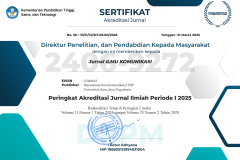Menertawakan Kejelataan Kita2: Transgresi Batas-Batas Marginalitas dalam Sinetron Komedi Bajaj Bajuri
DOI:
https://doi.org/10.24002/jik.v3i1.240Abstract
Abstract: Political transition in Indonesia since 1998 has created uncertain situation for most Indonesian people. Moreover, the hard economic condition has multiplied the number of people living below the poverty line. In these circumstances, the light entertainments such as situation comedy, which blends the portrait of ordinary people and their quaint life style, occupied the prime time of television programming in Indonesia. This paper discusses the popularity of the situation comedy Bajaj Bajuri (bajaj literally means “two-passenger pedicab motor with scooter machineâ€) in contemporary Indonesia. This series is about the daily life of Bajuri’s (bajaj’s driver) family and their lower class neighbours in the edge of metropolitan Jakarta (the capital city of Indonesia). Therefore, this paper focuses on the representation of the marginalised people and how television constructed the boundary of marginality. This paper argues that situation comedy is not only reinforcing stereotype of the lower class group but also transgressing the stereotypical image of the lower class by parodying and abusing popular discourse.
Downloads
Published
How to Cite
Issue
Section
License
Jurnal ILMU KOMUNIKASI is an academic journal. As such, it is dedicated to the open exchange of information. For this reason, JIK is freely available to individuals and institutions. Authors who publish in Jurnal ILMU KOMUNIKASI will release their articles under the Creative Commons Attribution (BY) License. This license allows anyone to copy and redistribute the article in any medium or format as well as remix, transform, and build upon the material for any purpose, even commercially as long as they credit the authors for the original creation. For details of the rights authors grants users of their work, see the "human-readable summary" of the license, with a link to the full license. (Note that "you" refers to a user, not an author, in the summary)
 This work is licensed under a Creative Commons Attribution 4.0 International License.
This work is licensed under a Creative Commons Attribution 4.0 International License.














